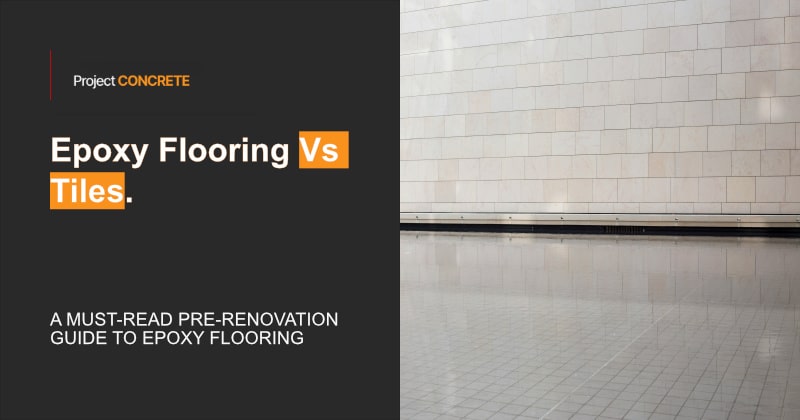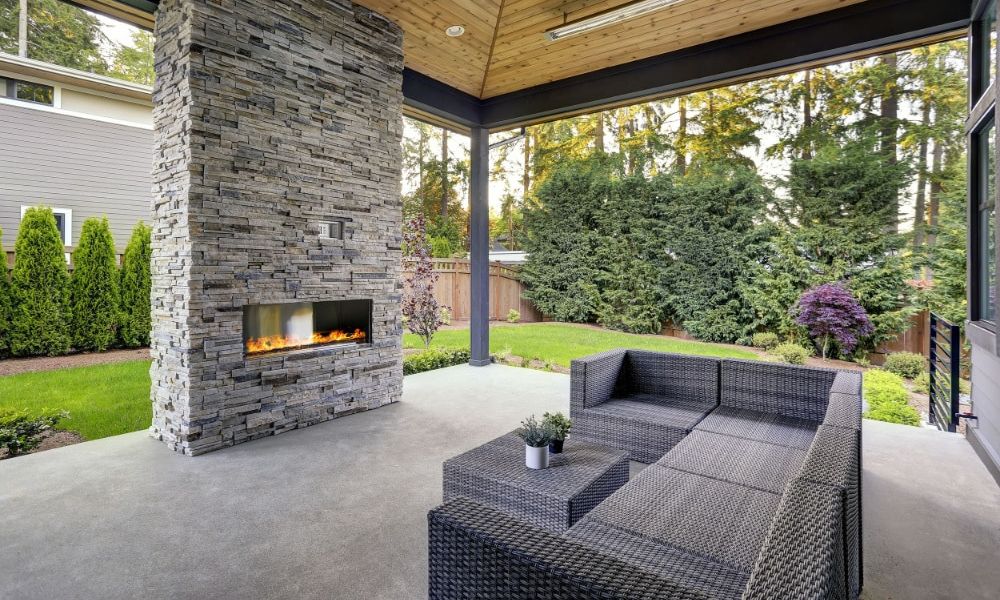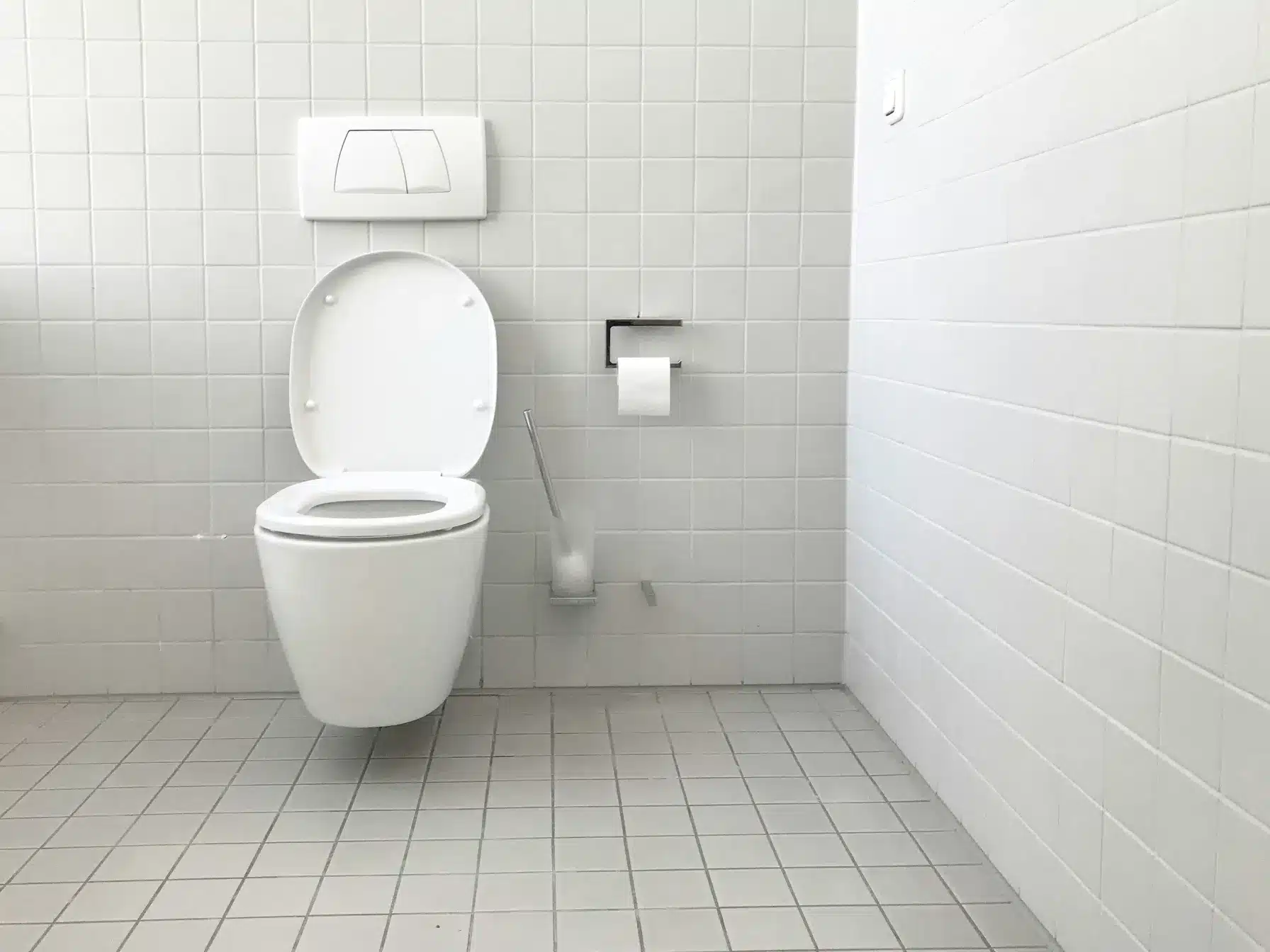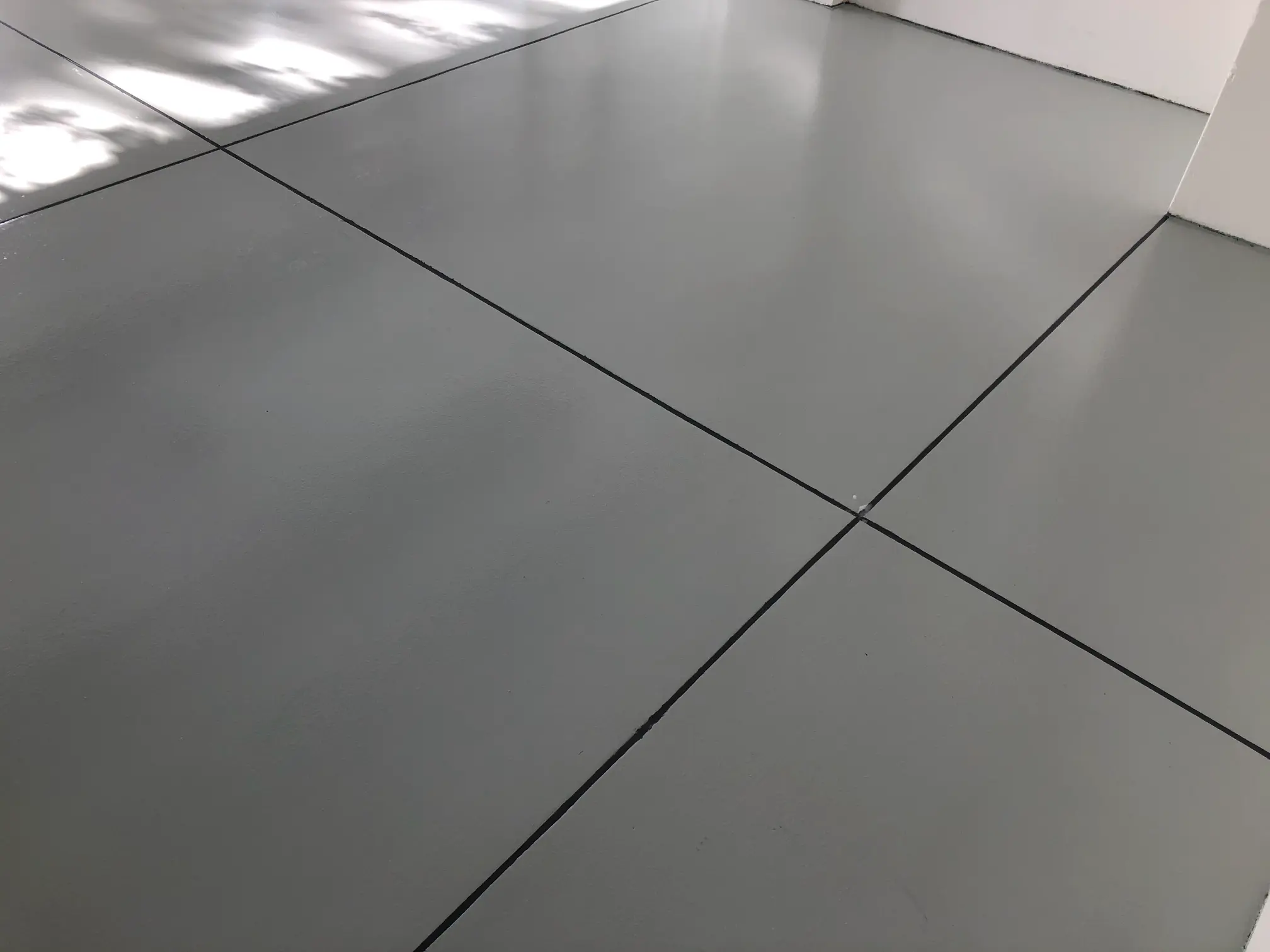
Deciding between epoxy flooring and tiles for your space involves weighing the benefits of each to meet your specific requirements. Epoxy flooring, with its unparalleled durability and seamless aesthetics, offers a modern solution for areas that need to withstand heavy traffic, be chemical resistant, and not be slipping hazards.
On the other hand, tiles present a classic choice with their vast selection of designs and materials, catering to diverse decorative tastes and functional needs. This comprehensive comparison aims to dissect the essential attributes, installation intricacies, upkeep demands, and cost implications of both flooring system.
By evaluating factors such as longevity, maintenance, aesthetic versatility, drying time, and budget, this article equips you with the knowledge to make a well-informed decision that best suits your environment, whether it be a bustling commercial setting or a cozy residential nook.
What is an epoxy floor?
Epoxy flooring is a resilient and versatile surface treatment that consists of two primary ingredients: epoxy resin and hardeners. These components, when mixed, undergo a chemical reaction to form a rigid plastic material that adheres robustly to most substrates.
Renowned for its durability, epoxy flooring stands up to wear, tear, and chemical spills, making it an exemplary choice for areas requiring high performance and low maintenance. Its customisation options, including a variety of colours and patterns, offer aesthetic flexibility to match diverse design needs.
This flooring is especially popular in industrial settings, garage floors and commercial spaces, where its longevity and ease of cleaning provide substantial benefits.

What is tiled flooring?
Tiles stand out as a highly versatile and popular flooring choice, made from diverse materials including ceramic, porcelain, stone, and glass. Each flooring material brings its own set of advantages, offering a blend of aesthetic appeal, durability, and environmental suitability.
Tiles are celebrated for their extensive range of designs, textures, and colours, allowing them to effortlessly enhance any decor style, from the classic to the modern. They are particularly valued in moisture-prone areas like bathrooms and kitchens, thanks to their highly resistant waterproof nature. Moreover, their inherent coolness provides a natural benefit in hot climates, contributing to a more comfortable indoor atmosphere.
Despite requiring somewhat more upkeep compared to other flooring options, the ease with which individual tiles can be replaced if damaged significantly contributes to their long-term viability. This fusion of functional and aesthetic qualities makes tiles a preferred selection across both residential and commercial settings.

Why choose epoxy flooring over tiles?
Opting for epoxy flooring over tiles presents numerous benefits, primarily due to its durability and resistance to wear. Epoxy floors stand up remarkably well against high traffic areas, impacts, and chemical spills, rendering them an excellent choice for both industrial and commercial settings.
Another significant advantage is its low maintenance and easy cleaning; being seamless, it does not allow dirt or bacteria to settle, and any spills can be cleaned up without hassle. When it comes to cost, epoxy flooring proves to be cost-effective in the long run. Despite a potentially higher initial investment compared to tiles, the savings accrued from its durability and reduced maintenance needs make it a financially savvy option.
Furthermore, the seamless and customisable aesthetics of epoxy flooring offer unmatched design flexibility. Unlike tiles, which are limited by grout lines and the potential for unevenness, epoxy coatings provide a smooth surface that can be tailored with a variety of colours and patterns to perfectly match any design intent.

Durability and Resistance to Wear
Epoxy flooring is highly durable and resistant to heavy duty wear. Designed to endure high traffic with its slip resistant properties, it surpasses traditional flooring options in toughness, making it a superior choice for high-demand environments.
Low Maintenance and Easy Cleaning
A standout feature of epoxy flooring is its effortless maintenance. Its seamless construction eliminates grout lines and crevices where dirt and bacterial growth might accumulate, making it remarkably easy to clean. Regular sweeping and the occasional mop are all it takes to keep it looking pristine.
Cost-effectiveness in the Long Run
Despite the potentially higher upfront cost compared to tiles, epoxy flooring is incredibly cost-effective over time. Its long-lasting durability and low maintenance requirements mean fewer repairs or replacements, leading to substantial savings in the long term.
Seamless and Customisable Aesthetics
Epoxy flooring offers seamless beauty and extensive customisation options. Free from the visual interruptions of grout lines, it provides a smooth, continuous surface. With a broad palette of colours and patterns available, it allows for unique design solutions that can enhance any space’s aesthetic appeal.
Why choose tiles over epoxy flooring?
Choosing tiles over epoxy flooring comes with its own set of advantages, particularly in terms of design flexibility and functional benefits. Tiles stand out for their wide variety of designs and materials, offering unparalleled options for customisation.
Whether aiming for a classic, elegant look or a sleek, modern aesthetic, tiles can accommodate any preference. They are particularly beneficial in hot climates, where their inherent coolness provides a comfortable underfoot experience, enhancing indoor comfort.
Another significant advantage is the ease of repair or replacement; should damage occur, individual tiles can be replaced without the need to overhaul the entire flooring, making it a practical and cost-effective maintenance solution. This blend of aesthetic versatility, temperature resistance, and straightforward upkeep makes tiles an appealing choice for diverse settings.
Wide Variety of Designs and Materials
Tiles boast an incredible diversity in designs and materials, offering endless possibilities for customisation. Whether it’s the warm aesthetics of ceramic, the refined elegance of porcelain, the timeless beauty of stone, or the unique transparency of glass, there’s a tile to suit every design vision.
This vast selection ensures that tiles can seamlessly integrate into any decor, enhancing both the functionality and visual appeal of a space.
Better Temperature Resistance in Hot Climates
Tiles are particularly valued for their natural coolness, making them an excellent choice for areas with hot climates. Their ability to resist temperature changes provides a consistently comfortable underfoot experience, significantly improving indoor comfort.
This temperature resistance is a key advantage, helping to maintain a cooler environment indoors without over-reliance on air conditioning.

Easier to Repair or Replace Damaged Sections
A practical benefit of choosing tiles is the ease with which damaged sections can be repaired or replaced. In contrast to flooring options that may require comprehensive work for minor damage, tiles allow for targeted repairs.
If a tile is cracked or chipped, it can be individually replaced, maintaining the floor’s integrity and appearance. This not only simplifies maintenance but also proves to be cost-effective, avoiding the need for extensive renovations for small areas of damage.
Ideal Use Cases for Epoxy Concrete Flooring
Epoxy flooring, celebrated for its robust durability and resistance to wear, finds its ideal applications in settings that demand resilience against heavy use or high traffic. Industrial settings, such as factories and warehouses, gain significantly from epoxy’s capacity to endure the rigors of heavy machinery and constant activity.
Garages and automotive workshops benefit from epoxy flooring’s resistance to oil spills, chemicals, and the heavy load of vehicle traffic, making it an indispensable choice.
Additionally, commercial spaces experiencing a high volume of foot traffic, including retail outlets, healthcare facilities, and educational institutions, value epoxy for its easy maintenance and enduring finish. The seamless and customisable nature of epoxy flooring not only ensures practicality but also offers design versatility, making it a preferred option across a diverse range of environments.
Industrial Settings with Heavy Machinery
Industrial settings that operate heavy machinery will suit an epoxy floor far better. Its superior durability and resistance to wear are perfectly suited to withstand the rigorous demands of factories, warehouses, and processing plants. Epoxy flooring’s ability to endure heavy loads, impacts, and chemical exposures ensures a safe and enduring surface, critical for industrial operations.
Automotive Workshop Garage Flooring Options
For automotive and garage flooring, epoxy floor coating options are the ideal solution. An epoxy concrete floor excels in resisting oil, grease, and a variety of chemical spills, common in automotive maintenance environments. The flooring’s robustness under the constant movement and weight of vehicles, coupled with its ease of maintenance, makes it a preferred choice for a garage floor, ensuring a clean and professional look in service areas.

Commercial Facilities with High Foot Traffic
Larger spaces bustling with high foot traffic, including retail outlets, dining establishments, medical facilities, and educational institutions, greatly benefit from an epoxy floor. Its ability to withstand continuous pedestrian activity, while offering a seamless and aesthetically adaptable finish, enhances the environment’s appeal.
Additionally, the low maintenance nature of epoxy flooring offers a practical and efficient solution for managing busy commercial settings, ensuring durability without compromising on style.
Ideal use cases for tiles
Tiles offer a versatile flooring that shines in environments where aesthetics, moisture resistance, and ease of maintenance are paramount. Bathrooms and wet areas greatly benefit from the water-resistant nature of tiles, making them the perfect choice for areas frequently exposed to moisture.
In kitchens, tiles not only endure spills and stains but also withstand high foot traffic, all while providing a plethora of design options to match any interior style.
For outdoor patios and walkways, tiles prove to be durable against the elements and offer a variety of styles to enhance outdoor aesthetics. The blend of durability, aesthetic versatility, and moisture resistance positions tiles as a preferred option for enhancing both residential and commercial spaces.
Bathrooms and Wet Areas
Bathrooms and wet areas greatly benefit from the water-resistant capabilities of tiles. This key feature ensures that these spaces, which are regularly exposed to moisture, remain durable and free from water damage over time. The ease with which tiles can be cleaned also aids in maintaining hygiene and preventing the growth of mould, making them an ideal choice for moisture-rich environments.
Kitchens with Potential for Spills
In kitchens, where spills are an everyday occurrence, tiles stand out as a practical and resilient flooring solution. Their stain resistance and easy maintenance make them perfectly suited to handle the rigors of kitchen life. Moreover, the vast array of tile designs available allows for a seamless integration into the kitchen’s decor, ensuring both functionality and style.
Outdoor Patios and Walkways
Outdoor patios and walkways are perfectly complemented by tile flooring, thanks to its durability and aesthetic versatility. Tiles are engineered to endure the elements, from harsh sunlight to rain, ensuring they remain beautiful and intact for years. The wide variety of designs and textures available in tiles also opens up endless possibilities for creating inviting and stylish outdoor spaces.
Longevity and Maintenance Comparison
When delving into the longevity and maintenance of epoxy flooring versus tiles, distinct contrasts come to light. An epoxy coating stands out for its exceptional durability, boasting a lifespan that can extend for decades with minimal care required. Its seamless design simplifies maintenance, eliminating grout lines that typically accumulate dirt, thus facilitating easy cleaning.
Conversely, tiles possess a significant degree of durability, particularly with high-quality materials like porcelain. Nonetheless, they might demand more regular maintenance due to the presence of grout lines prone to dirt and staining, which may also need periodic resealing to preserve their condition and appearance over time.
Each flooring option offers unique benefits in terms of lifespan and upkeep, underscoring the importance of evaluating the specific needs and environmental conditions they will be subjected to.
Epoxy Flooring Lifespan and Upkeep
Epoxy flooring shines with its remarkable longevity, capable of enduring for decades with the right installation and care. Its resilience to high traffic, impacts, and chemical spills significantly contributes to this durability, positioning it as a favoured choice for areas with heavy use.
Maintenance of epoxy flooring is impressively straightforward; its seamless nature means cleaning is as simple as routine sweeping and occasional mopping, ensuring it remains in top condition with minimal effort.
Tiles Durability and Cleaning Requirements
Tiles stand out for their robustness, with selections like porcelain renowned for their wear resistance and lasting quality. The durability of tiles largely depends on the material quality and the precision of the installation.
Despite their sturdiness, tiles present more demanding cleaning needs due to grout lines that can capture dirt and stains. To preserve their beauty and extend their lifespan, tiles require consistent cleaning and, from time to time, grout resealing, ensuring they continue to enhance spaces with their aesthetic appeal.
Cost comparison
When delving into the cost comparison between epoxy flooring and tiles, it’s crucial to evaluate both the initial installation costs and the long-term maintenance expenses. Epoxy flooring often comes with a higher upfront cost, attributed to the intricacy of its installation process. However, its exceptional durability and minimal upkeep translate into reduced long-term costs, establishing it as a cost-efficient choice over time.
Conversely, tiles may present a more affordable initial investment, particularly for standard materials. Yet, their ongoing maintenance requirements, including routine cleaning, potential repairs, and the periodic resealing of grout, can accumulate higher costs in the long run.
The ultimate cost-effectiveness of each flooring option hinges on the specific needs of the space, anticipated traffic levels, and the desired lifespan of the flooring solution.
Initial Installation Costs
Initial installation costs for epoxy flooring are generally on the higher side compared to tiles. This stems from the complex surface preparation and the precise application process required for epoxy, often necessitating skilled labor.
On the other hand, tiles can present a more economical upfront cost, especially with standard materials. However, the financial outlay can escalate with premium tiles or intricate laying patterns, indicating that material choice and design complexity significantly influence initial costs.
Long-term Maintenance Expenses
In terms of long-term maintenance expenses, epoxy flooring proves to be more economical over time. Its robustness and straightforward cleaning regimen mean less frequent need for repairs or exhaustive maintenance, leading to considerable savings across the flooring’s lifespan.
Conversely, tiles may entail higher ongoing costs due to the necessity for meticulous cleaning of grout lines, periodic resealing to guard against moisture, and the replacement of any cracked or damaged tiles, cumulatively increasing maintenance expenses over the years.
Final considerations in choosing between epoxy flooring and tiles
When weighing the options between epoxy flooring and tiles, several key considerations should influence the final decision. Aesthetic preferences and design flexibility play a crucial role; epoxy offers a sleek, seamless look that can be customised in a myriad of colours and patterns, whereas tiles boast a diverse array of designs and textures, catering to a wide range of stylistic tastes.
The specific needs for durability and maintenance are also vital; epoxy flooring is unmatched in environments that demand high durability and minimal upkeep, while tiles may be more suitable in areas where their coolness and the ease of replacing damaged sections are advantageous. Budget constraints and long-term costs must be carefully balanced; epoxy might present a higher initial investment but tends to be more cost-effective over time due to reduced maintenance needs.
In contrast, tiles can offer a lower upfront cost but may lead to higher long-term expenses due to maintenance and potential replacements. Considering these factors in relation to the unique requirements of the intended space will help in making a well-informed decision that aligns with both practical needs and aesthetic desires.
Aesthetic Preferences and Design Flexibility
Aesthetic preferences and design flexibility are crucial when choosing between epoxy flooring and tiles. Epoxy flooring provides a sleek, contemporary look with a wide array of customisation options, including a variety of colours and patterns, perfect for creating a unique space.
Conversely, tiles offer a classic beauty with an extensive assortment of designs, textures, and materials, allowing for detailed patterns and a more traditional aesthetic. This diversity ensures that regardless of your stylistic inclination, there’s a flooring option that can accommodate your vision.
Specific Needs for Durability and Maintenance
The specific needs for durability and maintenance play a significant role in flooring selection. Epoxy flooring is distinguished by its exceptional durability, resisting heavy traffic, impacts, and chemical spills with ease, making it ideal for areas requiring robust flooring solutions.
Additionally, its low maintenance requirements, necessitating only simple cleaning routines, add to its appeal. Tiles, while also durable, particularly porcelain or stone, necessitate more maintenance due to grout lines that can attract dirt and may need periodic resealing to maintain their condition.
Budget Constraints and Cost Over Time
Budget constraints and long-term cost considerations are pivotal in deciding between epoxy flooring and tiles. Epoxy flooring might entail a higher initial investment due to the complexity of its installation, but its durability and low maintenance can make it more economical over time.
Tiles can offer a lower initial cost, but their maintenance, including regular cleaning and potential repairs, could result in higher expenses in the long run. Evaluating both the upfront and ongoing costs is essential for making a financially sound decision that aligns with your budget and flooring needs.
